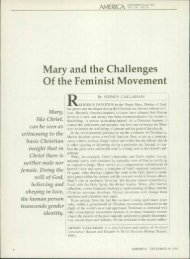You also want an ePaper? Increase the reach of your titles
YUMPU automatically turns print PDFs into web optimized ePapers that Google loves.
A Catholic Alternative<br />
What’s missing in the debate on education<br />
BY ROBERT J. BIRDSELL<br />
The failure to educate poor minority children<br />
has remained an intractable problem,<br />
unsolved after almost 40 years of<br />
sustained federal efforts, despite the creation<br />
of the U.S. Department of Education in<br />
1979. Arne Duncan, President Barack Obama’s<br />
choice for education secretary, has a big surprise<br />
coming: the problem he inherits is about to get<br />
exponentially worse. In short order, President<br />
Obama’s education team will be buffeted by three<br />
converging forces poised to overwhelm <strong>America</strong>’s<br />
K-12 school system: the swift decline in revenues<br />
available to fund public schools; the unsustainable<br />
cost of K-12 education as currently delivered;<br />
and the economic collapse of the Catholic<br />
parochial school system.<br />
Already, the unnecessary and tragic closing of<br />
hundreds of inner-city Catholic schools has<br />
caused the first crushing waves of pressure to be<br />
felt. If this crisis is not addressed soon by more<br />
enlightened policies that support faith-based<br />
schools as a critical component of our national<br />
educational landscape, then hundreds of thousands<br />
of students—who previously were educated<br />
at little or no cost to the state—will enter public<br />
school systems that will be unable to accommodate<br />
them.<br />
It is time to invite faith-based schools to be part of the<br />
national solution to public education’s woes. What does that<br />
mean? At its simplest, it means making sure that faithbased<br />
schools are part of the national conversation. At its<br />
most complex, it means public support for these schools<br />
beyond lip service or mere financial relief, as a genuine and<br />
effective alternative for inner-city children who have no<br />
access to quality public education.<br />
Defining exactly what “public support” means should be<br />
high on Secretary Duncan’s agenda if he has any hope of<br />
reversing the deterioration of our educational system. Many<br />
of us in faith-based institutions are watching with interest<br />
to see whether bodies like the White House Office of Faith-<br />
Based and Neighborhood Initiatives will accomplish something<br />
or produce only empty talk.<br />
ROBERT J. BIRDSELL is president and chief executive officer of the Cristo<br />
Rey Network, which operates 22 Catholic schools in 19 U.S. cities.<br />
Certainly things need to begin with talk, but that talk<br />
needs to set a clear agenda leading to concrete action. So let<br />
us get an honest conversation started that includes all the<br />
players. And let us also be clear on the daunting financial<br />
issues facing public education across the country.<br />
The decline in property and other tax revenues that pay<br />
for public education will soon put public schools under<br />
enormous budgetary pressure to accept cuts. More money is<br />
almost always the proposal to fix public education, but that<br />
option is gone for the moment. Instead, brace for announcements<br />
like the one almost made in Detroit earlier this year,<br />
that large urban school systems cannot make payroll and<br />
will have to close their doors.<br />
At the same time, however, the costs involved in delivering<br />
K-12 public education continue to skyrocket. In inflation-adjusted<br />
dollars, public schools are spending more than<br />
10 times per student what they spent just after World War<br />
II. Yet the United States now has math and science scores<br />
20 <strong>America</strong> May 11, 2009









